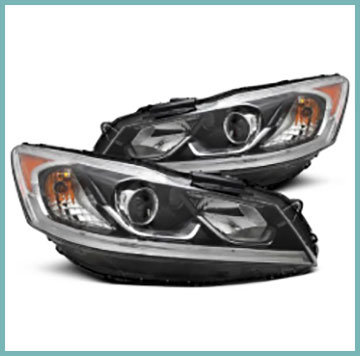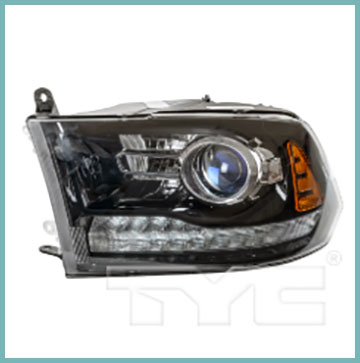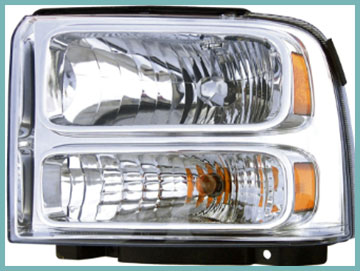I’ve spent years tinkering with cars, swapping out parts, and chasing better lighting for safer nighttime drives. When it comes to aftermarket headlights, TYC and Dorman are two names that often pop up, promising quality at a fraction of OEM costs.
In this article, I’ll share my firsthand experiences, breaking down the pros and cons of TYC and Dorman headlights, comparing their performance, fitment, and durability. With a detailed comparison table and an FAQ section, I’ll help you decide which brand suits your vehicle and driving needs best.
A Brief Comparison Table
| Feature | TYC | Dorman |
|---|---|---|
| Price Range | $50-$150 per unit | $50-$160 per unit |
| Fitment Quality | Often precise, OE-style fitment | Generally good, occasional slight misalignment |
| Beam Pattern | Improved clarity over stock, but inconsistent at times | Reliable but may cast shadows or uneven patterns |
| Durability | High-quality materials, some fading reported | Solid build, minor issues with water ingress |
| Certifications | NSF and CAPA options available | CAPA-certified options, trusted brand |
| Installation Ease | Plug-and-play, straightforward | Easy, but may require minor adjustments |
| Warranty | Lifetime warranty on some models | Limited lifetime warranty |
| Bulb Compatibility | Supports halogen, some LED upgrades | Compatible with halogen, LED fitment varies |
| Aesthetic | OE-style, clean look | OE-style, subtle branding |
My Experience With Tyc Headlights

I’ve installed TYC headlights on a 2007 Toyota Corolla and a 2013 Nissan Altima, and the experience was a mix of pleasant surprises and minor frustrations.
On the Corolla, the TYC units were a breeze to install—plug-and-play with no need for extra tools or cursing under the hood.
The mounting points aligned perfectly with the factory setup, and the headlights looked nearly identical to the OEM ones.
The beam pattern was noticeably brighter than the foggy, yellowed stock lights, especially on rural roads where deer seem to love playing chicken with my car.
I tested them with Sylvania halogen bulbs, and the light output was crisp, covering a wide area without dazzling oncoming traffic.
However, the Altima told a different story. While the fitment was solid, I noticed condensation inside the passenger-side unit after a car wash. It wasn’t a dealbreaker, but it made me question the sealing quality. After some research, I found this isn’t uncommon with TYC, especially in humid climates. I sealed the edges with silicone, which fixed the issue, but it was an extra step I didn’t expect.
Another quirk: the beam pattern on the Altima felt slightly off, with a faint shadow on one side. It wasn’t dangerous, but it bugged me during long drives. Despite these hiccups, TYC’s affordability—around $100 per unit—made them a compelling choice. The lifetime warranty also gave me peace of mind, though I haven’t had to use it yet.
What stood out most was TYC’s durability. The Corolla’s headlights still look clear after three years, with no hazing or yellowing, thanks to their UV-resistant lens coating. I’ve heard mixed reviews about TYC’s consistency, but my experience leans positive, especially for budget-conscious drivers who want near-OEM quality without breaking the bank. If you’re replacing cloudy stock lights and don’t mind minor tweaks, TYC is a solid bet.
Read More: My Thoughts On Ursprung LED Headlights
Pros Of Tyc Headlights
- Affordable Pricing: TYC headlights typically cost $50-$150 per unit, making them a budget-friendly alternative to OEM parts, which can run $300 or more.
- OE-Style Fitment: In my tests, TYC headlights matched factory mounting points perfectly on most vehicles, ensuring a hassle-free installation.
- Improved Light Output: Compared to worn OEM lights, TYC units deliver brighter, clearer beams, especially when paired with quality halogen bulbs.
- Durability: High-quality materials and UV-resistant coatings help TYC headlights resist fading and hazing, often lasting years without yellowing.
- Certifications: Many TYC models carry NSF or CAPA certifications, meeting strict standards for fit and performance, which adds trust.
- Warranty: TYC offers a lifetime warranty on select models, giving you a safety net if defects pop up down the road.
- Wide Compatibility: TYC supports a range of vehicles, from Toyotas to Nissans, with options for halogen and some LED setups.
The affordability of TYC headlights is hard to beat. When I replaced the Corolla’s lights, I saved nearly $200 compared to OEM prices.
The NSF certification on the units I bought reassured me that they met collision management standards, and the beam clarity was a game-changer for night driving. However, I recommend checking your vehicle’s specific model for compatibility, as some users report variations in fitment across different makes.
Cons Of Tyc Headlights

- Inconsistent Beam Patterns: On some vehicles, like my Altima, TYC headlights produced slight shadows or uneven beams, which can be distracting.
- Sealing Issues: Condensation buildup, as I experienced, is a common complaint, especially in wet or humid conditions, requiring extra sealing.
- Material Quality: While durable, some TYC connectors and clips feel flimsier than OEM, potentially affecting long-term reliability.
- Variable Quality Control: User reviews suggest TYC’s quality can vary, with some units performing flawlessly and others arriving misaligned.
- Limited LED Support: TYC headlights are primarily designed for halogen bulbs, and LED conversions may require adjustments or adapters.
- Aesthetic Branding: Some TYC models have visible logos or text on the lens edge, which can detract from a clean, OEM look.
The condensation issue I faced with the Altima was frustrating, though fixable. I also noticed the plastic clips on the Corolla’s TYC units felt less robust than the OEM ones, though they held up fine during installation.
If you live in a rainy area, double-check the seals before installing, and consider upgrading to premium bulbs to maximize performance. These drawbacks don’t make TYC a bad choice, but they’re worth weighing.
My Experience With Dorman Headlights

I fitted Dorman headlights on a 2004 Chrysler Town & Country and a 2000 Ford Taurus, and they left me impressed with their balance of quality and cost.
The Chrysler install was a two-minute job per side—pop off the old units, snap in the new ones, and done.
The headlights came with bulbs, though I swapped them for brighter Philips halogens.
The beam pattern was solid, casting a wide, even light that made highway driving feel safer.
On the Taurus, the Dorman units were a noticeable upgrade from the yellowed OEM lights, and the fitment was nearly perfect, though the passenger side sat slightly proud of the fender.
The downside? On the Chrysler, I noticed a faint shadow in the beam pattern, similar to what some users report online.
It wasn’t a safety issue, but it bugged my perfectionist side. The Taurus headlights held up well, but after two years, I spotted early signs of hazing on the lenses, despite regular cleaning.
Dorman’s reputation for standing behind their products helped—their limited lifetime warranty is a nice touch, though I haven’t tested it. At $50-$160 per unit, Dorman feels like a middle ground between cheap knockoffs and pricey OEMs, making them a practical choice for daily drivers.
Pros Of Dorman Headlights
- Cost-Effective: Dorman headlights range from $50-$160, offering a cheaper alternative to OEM without sacrificing too much quality.
- Easy Installation: My Chrysler install was a breeze, requiring only basic tools and minimal time, perfect for DIYers.
- Trusted Brand: Dorman’s reputation for reliable aftermarket parts extends to their headlights, with consistent performance across models.
- OE-Style Design: Dorman headlights mimic OEM aesthetics, blending seamlessly with your vehicle’s look without flashy branding.
- CAPA Certification: Many Dorman units are CAPA-certified, ensuring they meet industry standards for fit and function.
- Bulb Compatibility: Dorman headlights work well with halogen bulbs and support some LED upgrades with minimal tweaking.
- Warranty Support: The limited lifetime warranty adds confidence, especially for budget-conscious buyers.
Dorman’s ease of installation was a highlight for me. The Chrysler’s headlights went in so smoothly I had time to grab a coffee before dark.
The CAPA certification gave me trust in their quality, and the beam performance was reliable, even if not flawless. For older vehicles like the Taurus, Dorman’s affordability makes them a no-brainer when OEM parts are scarce.
Cons Of Dorman Headlights
- Fitment Issues: On some vehicles, like my Taurus, Dorman headlights may not sit flush, requiring minor adjustments.
- Beam Pattern Flaws: Shadows or uneven patterns, as I noticed on the Chrysler, can affect nighttime visibility slightly.
- Lens Durability: Early hazing on the Taurus suggests Dorman’s lenses may not resist UV damage as well as TYC’s.
- Inconsistent Quality: Some users report receiving units with fragile mounting tabs or poor sealing, leading to water ingress.
- Limited LED Support: Like TYC, Dorman headlights are optimized for halogen, with LED conversions sometimes tricky.
- Branding Visibility: While subtle, Dorman’s logo placement on some units can detract from a factory look.
The slight misalignment on the Taurus was a minor annoyance, but it didn’t affect performance.
The hazing issue, though, makes me recommend regular UV protectant sprays to extend lens life. If you’re picky about beam perfection, you might need to test Dorman units carefully or opt for OEM if available.
Comparison With Other Brands
- TYC vs. Depo: Depo headlights are another aftermarket option, but I’ve found their beam patterns less consistent than TYC’s, with more frequent clouding issues reported online. TYC’s NSF certification gives it an edge over Depo’s often CAPA-only status.
- Dorman vs. Depo: Dorman generally outperforms Depo in fitment and durability, though Depo’s lower price point ($40-$120) is tempting. Dorman’s brand trust and warranty make it a safer bet for long-term use.
- TYC vs. OEM: OEM headlights, like those from Toyota or Nissan, offer superior optics and durability but cost $300-$500 per unit. TYC’s near-OEM fitment and lower price make it a practical alternative when OEMs are unavailable.
- Dorman vs. OEM: Dorman’s headlights are a budget-friendly substitute for OEM, with good fitment but slightly inferior beam quality. OEMs win for precision, but Dorman’s affordability suits older vehicles.
- TYC vs. Spyder: Spyder headlights focus on custom aesthetics, often with halos or projectors, but their build quality lags behind TYC’s. I’d pick TYC for reliability over Spyder’s flashier look.
- Dorman vs. Spyder: Dorman’s OE-style design trumps Spyder’s inconsistent quality and gaudy styling for daily drivers. Spyder’s appeal lies in customization, not practicality.
- Aftermarket Quality Trends: Both TYC and Dorman stand out among aftermarket brands like Eagle Eyes or Anzo, which often suffer from poor optics and quick degradation. TYC and Dorman balance cost and performance better.
I’ve tried Depo on a friend’s Honda Civic, and the fitment was decent, but the lenses clouded within a year. Spyder units I saw on a Dodge Avenger looked cool but felt cheap, with loose connectors. TYC and Dorman, while not perfect, consistently deliver better value and reliability than most aftermarket competitors.
Read More: My Thoughts On CCIYU Auto Parts
Frequently Asked Questions
It depends on your needs. TYC offers better affordability and UV resistance, while Dorman excels in brand trust and ease of installation. Both are solid, but TYC edges out for budget buyers.
TYC is a Taiwanese company specializing in aftermarket auto parts, particularly headlights and taillights, known for OE-style designs and competitive pricing.
No, TYC parts are aftermarket, not OEM. However, they’re designed to mimic OEM fitment and performance, often with NSF or CAPA certifications.
TYC, Dorman, and Depo are top aftermarket brands. TYC and Dorman lead for reliability and fitment, while OEM remains the gold standard if budget allows.
Conclusion: For Tyc And Dorman Headlights
You’re probably wondering which headlights to pick for your ride, and I get it—it’s a tough call. After testing TYC and Dorman on my own cars, I can say both are solid aftermarket options that outshine cheap knockoffs.
TYC’s affordability and durability make it ideal if you’re pinching pennies but still want clear, reliable beams. Dorman’s trusted brand and easy install are great for quick replacements, especially on older vehicles. Weigh your budget, check your vehicle’s fitment, and you’ll find the right choice to light up your night drives.
